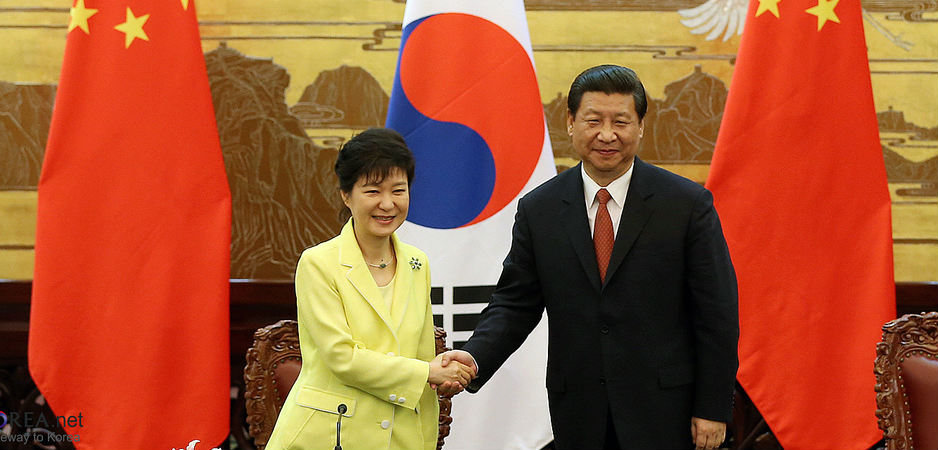Is China’s perception of stability on the Korean Peninsula changing?
On September 3, China’s Victory Day celebrations unveiled a turning point in northeast Asian relations: South Korean President Park Geun-hye was present, while her North Korean counterpart Kim Jong-un was not. Kim’s absence signaled a dramatic shift in the triangular relationship between China and both Koreas, which has been based on Beijing’s desire to preserve stability on the Korean Peninsula.
Though the two Korean states have been seeking reunification on their own terms over the last decade, the relationship had taken a step back following events in August, beginning with a landmine maiming two South Korean soldiers in the demilitarized zone (DMZ), leading to artillery rounds fired from both sides. While high-level talks were held to ease tensions, North Korea’s destabilizing behavior became an opportunity for Beijing and Seoul to reassess their relationship.
Park’s attendance shortly after a summer of tension shows how Beijing has hoped to use its friendly relations with Seoul as leverage against Pyongyang. China, after all, has been providing the financial and political support that has kept the Kim regime in power since the end of the Korean War in 1953.
Wary of Beijing’s support of its neighbor, South Korea has simultaneously engaged with and balanced against a rising China in recent years. Seoul has cooperated with China in the form of trade over North Korea, but has balanced against China by emphasizing the importance of the strategic alliance with the United States. Stronger cooperation between the two Confucian nations would be mutually advantageous, as the triangular relationship has not fostered lasting stability on the Korean Peninsula. President Park should use political leverage to persuade China to gradually end relations with North Korea and side with South Korea.
Of course, a closer relationship with China would come at the expense of relations with the US. Yet Park’s attendance at the Victory Day celebrations, despite US pressure not to, shows that such a relationship is already taking shape.
President Park should persuade China to turn a blind eye to cross-border smuggling activities—where North Korean traders have been bringing smartphones and radios into the Hermit Kingdom, which in turn educates North Koreans about the world around them. More importantly, President Park could strike a deal with Beijing to allow North Korean defects to escape safely into South Korea. If China is tired of Western governments criticizing its human rights record, Park could reason with the government, which would at least help North Korean refugees.
China’s Traditionalists and Progressives
Two main factors have led to Beijing reassessing its relationship with the two Koreas.
First, China’s current policy is contradictory and is clearly not working. It finances the Kim dynasty by paying for its fuel, food and guns, while simultaneously encouraging the north to follow the same economic trajectory that transformed China—to no avail.
Second, Sino-North Korean relations have been at their coolest for years. Since President Xi Jinping took the helm in China in 2012, official communication between North Korea and China has shrunk to a “trickle,” and factions have emerged within the Chinese government over North Korea; between traditionalists those who still see the DPRK as a strategic asset and progressives who view it as a liability.
The traditionalists assert the need to maintain the status quo. They insist that Beijing must continue to back Pyongyang as a buffer against the US and its allies, especially South Korea. Though they concede that the north is an unreliable ally, it is still an ally among hostile neighbors in the region (China has territorial disputes with all its neighbors save for Pakistan). Even worse, the conventional wisdom is that if North Korea collapses, a joint South Korean and American-sponsored government would take its place, setting US soldiers at China’s borders.
These arguments have been outdated since the end of the Cold War, retort the progressives. This faction emphasizes the importance of maintaining a solid relationship with the US and understanding the limitations of the Pyongyang regime. Indeed, while traditionalists have emphasized preserving stability on the Korean Peninsula, the progressives point out that North Korea’s nuclear weapons program is destabilizing and harms China’s national interests.
Until the progressives can sway Beijing’s policy over the Koreas, the peninsula will be unstable. Worse, if Pyongyang is to acquire nuclear weapons, China will be forced to act with unpredictable consequences.
The Victory Day celebrations were an exercise in muscle flexing, but its official aim was to “convey to the world that it is devoted to safeguarding international order, rather than challenging it,” as a People’s Liberation Army official puts it.
If China wants to show it is a responsible world power, it should pull the plug on funding a rogue state. The stability of the region may depend on it.
The views expressed in this article are the author’s own and do not necessarily reflect Fair Observer’s editorial policy.
Photo Credit: Republic of Korea
 We bring you perspectives from around the world. Help us to inform and educate. Your donation is tax-deductible. Join over 400 people to become a donor or you could choose to be a sponsor.
We bring you perspectives from around the world. Help us to inform and educate. Your donation is tax-deductible. Join over 400 people to become a donor or you could choose to be a sponsor.
Support Fair Observer
We rely on your support for our independence, diversity and quality.
For more than 10 years, Fair Observer has been free, fair and independent. No billionaire owns us, no advertisers control us. We are a reader-supported nonprofit. Unlike many other publications, we keep our content free for readers regardless of where they live or whether they can afford to pay. We have no paywalls and no ads.
In the post-truth era of fake news, echo chambers and filter bubbles, we publish a plurality of perspectives from around the world. Anyone can publish with us, but everyone goes through a rigorous editorial process. So, you get fact-checked, well-reasoned content instead of noise.
We publish 2,500+ voices from 90+ countries. We also conduct education and training programs
on subjects ranging from digital media and journalism to writing and critical thinking. This
doesn’t come cheap. Servers, editors, trainers and web developers cost
money.
Please consider supporting us on a regular basis as a recurring donor or a
sustaining member.
Will you support FO’s journalism?
We rely on your support for our independence, diversity and quality.






